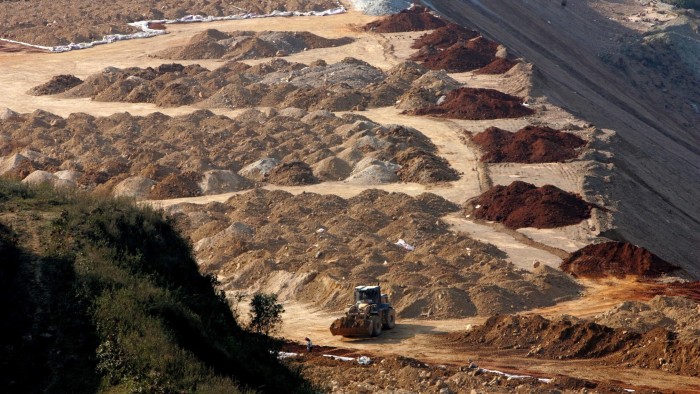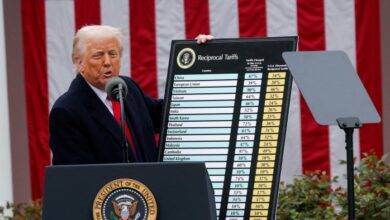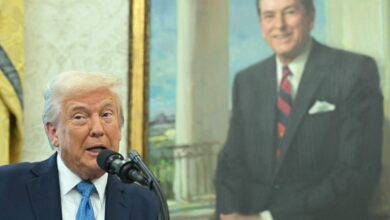China’s rare earths controls prompt fears of auto shortages and shutdowns

Unlock the Editor’s Digest for free
Roula Khalaf, Editor of the FT, selects her favourite stories in this weekly newsletter.
China’s latest export controls on rare earth minerals could cause shutdowns in automotive production, with stockpiles of essential magnets set to run out within months if Beijing fully chokes off exports.
Beijing expanded its export restrictions to seven rare earth elements and magnets vital for electric vehicles, wind turbines and fighter jets in early April in retaliation for US President Donald Trump’s steep tariffs of 145 per cent on China.
Government officials, traders and auto executives said that, with inventories estimated to last between three and six months, companies would be racing to stockpile more material and find alternative supplies to avoid major disruption.
Jan Giese, a metals trader at Frankfurt-based Tradium, warned that customers had been caught off guard and most car groups and their suppliers appear to be holding only two to three months’ worth of magnets.
“If we don’t see magnet deliveries to the EU or Japan in that time or at least close to that, then I think we will see genuine problems in the automotive supply chain,” said Giese.
China’s latest controls focused on “heavy” and “medium” rare earths that enable high-performance magnets that can withstand higher temperatures, such as dysprosium, terbium and samarium. These are vital for military applications such as jets, missiles and drones, as well as rotors, motors and transmissions that feature heavily in electric and hybrid vehicles.
A senior automotive executive said the critical mineral restrictions would be “consequential” for Tesla and all other car manufacturers, describing the export controls as a “7 or 8” on a scale of 1 to 10 in terms of severity.
“It’s a form of retaliation where the Chinese government can say ‘OK, we’re not going to go tit-for-tat any more on the tariff rate but we will hurt you USA and we will incentivise companies to plead with your own home governments to change tariff policy’,” he said.
Rare earth metals are commonly found in the earth’s crust but are difficult to extract at low cost and in an environmentally friendly manner, with China commanding a near monopoly on heavy rare earths processing.
The “light” rare earths, such as neodymium and praseodymium, used in larger quantities in magnets have not been targeted, giving Beijing a “big threat vector” to expand controls if the trade war intensifies, said Cory Combs of Beijing-based Trivium, a consultancy.
Beijing’s controls require exporters to gain licences for each shipment of material overseas and have expanded their scope to ban re-exports to the US. However, application of the curbs — which have covered a gradually expanding group of critical minerals since 2023 in response to US blocks on Chinese access to chip technology — has been far from universal.
Chinese exporters have already declared force majeure on cargoes of rare earths and magnets heading overseas and have withdrawn material for sale from the market, further obscuring the price of already opaque commodities.
Japan and other nations are pinning hopes on loosening China’s grip over the heavy rare earths through Australia’s Lynas, which is set to expand its Malaysian processing site to produce dysprosium and terbium by mid-2025.
“Heavy rare earth stockpile elements do not suffice to avoid potential turbulence of automotive supply chains,” said a Japanese government official, who added that national stockpiles should provide extra relief beyond the two to three months of supply held by automakers.
“The issue is whether we can build the new, alternative supply chain in time for our stockpile to survive this,” he added.
It is not yet clear from Chinese government announcements since April 2 how Beijing plans to implement the latest export controls.
The export controls come as China faces declining feedstock for the heavy rare earths because of the civil war in Myanmar, analysts said, meaning a block on exports would shore up domestic supplies.
Experts have noted that over recent years, China has been reluctant to block shipments that would damage its own economic interests, such as gallium, but shipments have been heavily snarled up of other metals such as antimony, which is used to make bullets.
“The crucial question is how long they will take to process the export licences,” said Giese.
https://www.ft.com/__origami/service/image/v2/images/raw/https%3A%2F%2Fd1e00ek4ebabms.cloudfront.net%2Fproduction%2F1069b2d1-63de-465f-a6ad-6726ef6ec3e3.jpg?source=next-article&fit=scale-down&quality=highest&width=700&dpr=1
2025-04-20 04:00:09








